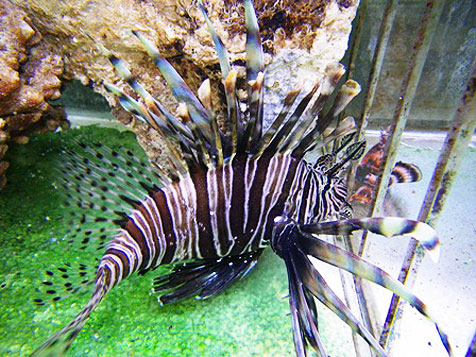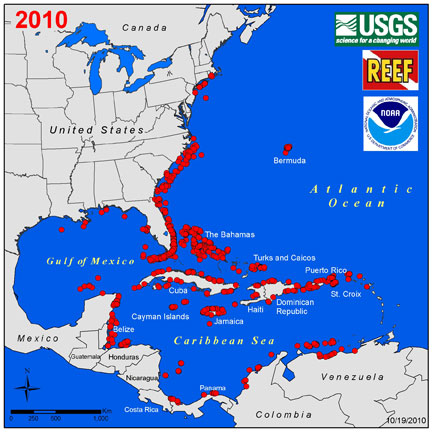
Pterois volitans lionfish collected in the Atlantic awaits shipment to a home aquarium. Image courtesy Scott Hughes, Saltwaterfish.com
Here is fish that everyone wants to put on the endangered species list, at least in the waters of South Florida, the Bahamas, and the Caribbean. Marine aquarium keepers can do their part, says one livestock dealer, by supporting the capture and sale of live Pterois spp. lionfish taken from tropical Atlantic waters.
Potentially one of the worst cases of animals from the pet trade becoming an environmental menace, Pterois volitans and P. miles are believed to have been accidentally spilled into Biscayne Bay, Florida, from an oceanfront aquarium during Hurricane Andrew in 1992. Their adopted range in the western Atlantic Ocean continues to grow alarmingly, and fisheries biologists fear they are capable of impacting populations of native reef fish species unless they are somehow controlled.
 One member of the aquarium trade is starting an effort to get hobbyists to buy live Atlantic lionfish rather than stock imported from the Indo-Pacific. “Our goal is to sell only Altantic lionfish,” says Scott Hughes, of Saltwaterfish.com in Ft. Pierce, Florida. “We’ve instructed our collectors in Florida and Haiti to send as many as they can to us. We are essentially trying to create this market.”
One member of the aquarium trade is starting an effort to get hobbyists to buy live Atlantic lionfish rather than stock imported from the Indo-Pacific. “Our goal is to sell only Altantic lionfish,” says Scott Hughes, of Saltwaterfish.com in Ft. Pierce, Florida. “We’ve instructed our collectors in Florida and Haiti to send as many as they can to us. We are essentially trying to create this market.”
“We sell the Atlantic Lionfish for $19.99 to encourage sales,” says Hughes. “That’s $10.00 less than our least expensive Pacific Lionfish. We hope that hobbyists will embrace the efforts and will choose Atlantic lionfish for their tanks. (Our experience is that they are identical to their Pacific counterparts). It’s not THE solution, but it creates a market for the collectors that would not have ordinarily existed, and as we all know, the more we can get out of the water the better.”
Bill Backus of A&M Aquatics, a marinelife wholesaler in Lansing, Michigan, says he was impressed with the health and vigor of Pterois lionfish he speared in the Bahamas on a dive trip with author Matthew Wittenrich reported in CORAL in 2009 (Lionfish in the Atlantic). “At that point, we were told it was illegal to possess these fish on a boat, but we have had them in stock weekly for the past few months. They are collected more as a by-catch when collecting other reef fish. We are not currently differentiating between Caribbean Basin or Indo-Pacific. The fish collected from the Caribbean are probably better suited for the aquarium trade than the imports from the South Pacific. The pack time is shorter as well as the transit from collection point to the holding facilities.”
Amy J. Benson, a fishery biologist with the US Geological Survey in Gainesville, Florida says that the latest sitings map, above, shows the invasion now reaching far into the Gulf of Mexico and Central and South America. “Comments about how healthy they seem are absolutely right. They are fat and happy here.” [Coral Magazine]
